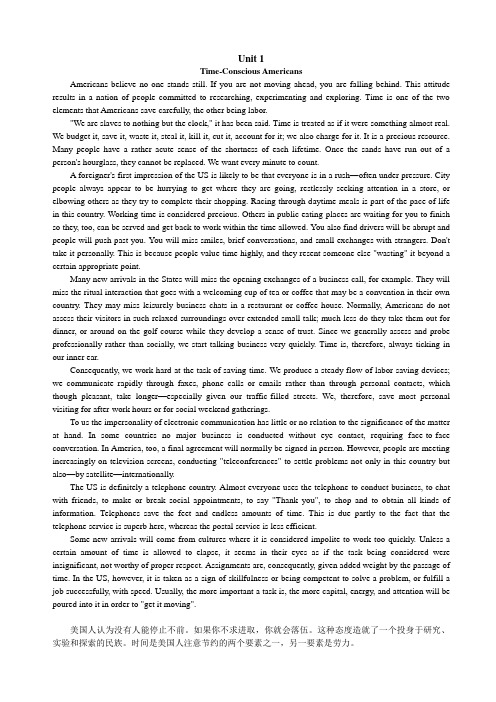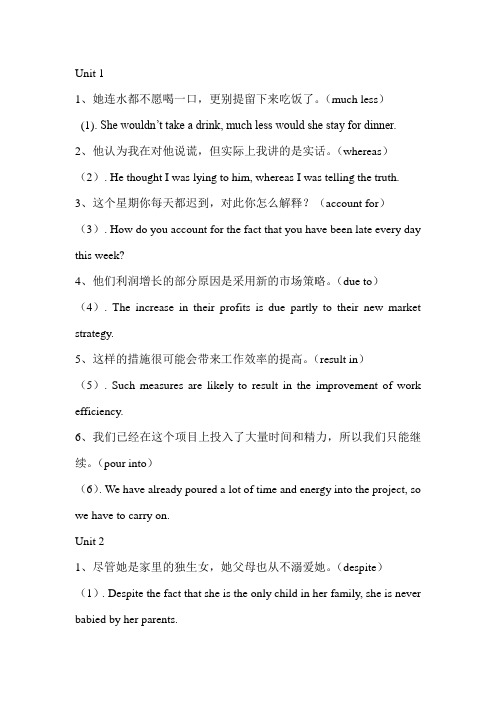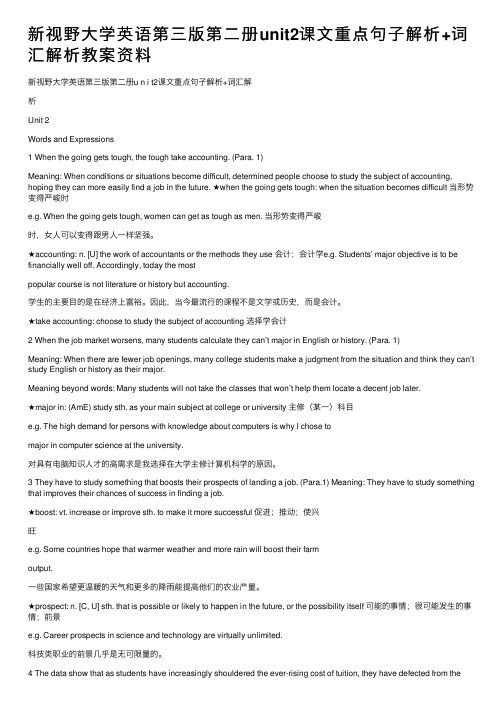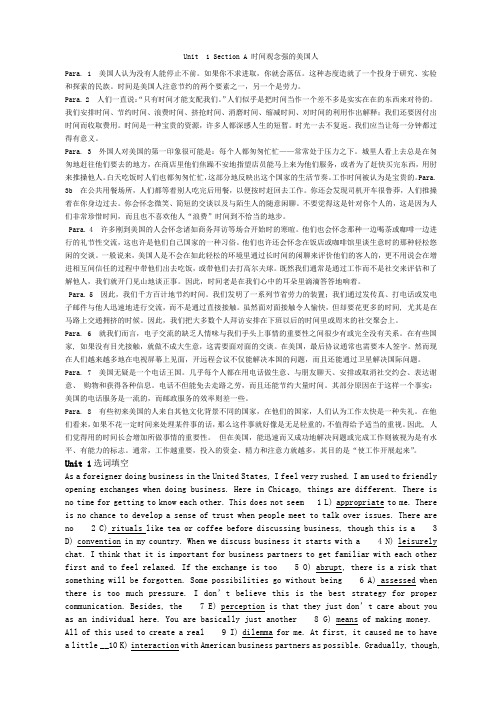新视野大学英语第二册课堂笔记
新视野大学英语读写教程(第二版)第二册课文及翻译

Unit 1Time-Conscious AmericansAmericans believe no one stands still. If you are not moving ahead, you are falling behind. This attitude results in a nation of people committed to researching, experimenting and exploring. Time is one of the two elements that Americans save carefully, the other being labor."We are slaves to nothing but the clock," it has been said. Time is treated as if it were something almost real. We budget it, save it, waste it, steal it, kill it, cut it, account for it; we also charge for it. It is a precious resource. Many people have a rather acute sense of the shortness of each lifetime. Once the sands have run out of a person's hourglass, they cannot be replaced. We want every minute to count.A foreigner's first impression of the US is likely to be that everyone is in a rush—often under pressure. City people always appear to be hurrying to get where they are going, restlessly seeking attention in a store, or elbowing others as they try to complete their shopping. Racing through daytime meals is part of the pace of life in this country. Working time is considered precious. Others in public eating-places are waiting for you to finish so they, too, can be served and get back to work within the time allowed. You also find drivers will be abrupt and people will push past you. You will miss smiles, brief conversations, and small exchanges with strangers. Don't take it personally. This is because people value time highly, and they resent someone else "wasting" it beyond a certain appropriate point.Many new arrivals in the States will miss the opening exchanges of a business call, for example. They will miss the ritual interaction that goes with a welcoming cup of tea or coffee that may be a convention in their own country. They may miss leisurely business chats in a restaurant or coffee house. Normally, Americans do not assess their visitors in such relaxed surroundings over extended small talk; much less do they take them out for dinner, or around on the golf course while they develop a sense of trust. Since we generally assess and probe professionally rather than socially, we start talking business very quickly. Time is, therefore, always ticking in our inner ear.Consequently, we work hard at the task of saving time. We produce a steady flow of labor-saving devices; we communicate rapidly through faxes, phone calls or emails rather than through personal contacts, which though pleasant, take longer—especially given our traffic-filled streets. We, therefore, save most personal visiting for after-work hours or for social weekend gatherings.To us the impersonality of electronic communication has little or no relation to the significance of the matter at hand. In some countries no major business is conducted without eye contact, requiring face-to-face conversation. In America, too, a final agreement will normally be signed in person. However, people are meeting increasingly on television screens, conducting "teleconferences" to settle problems not only in this country but also—by satellite—internationally.The US is definitely a telephone country. Almost everyone uses the telephone to conduct business, to chat with friends, to make or break social appointments, to say "Thank you", to shop and to obtain all kinds of information. Telephones save the feet and endless amounts of time. This is due partly to the fact that the telephone service is superb here, whereas the postal service is less efficient.Some new arrivals will come from cultures where it is considered impolite to work too quickly. Unless a certain amount of time is allowed to elapse, it seems in their eyes as if the task being considered were insignificant, not worthy of proper respect. Assignments are, consequently, given added weight by the passage of time. In the US, however, it is taken as a sign of skillfulness or being competent to solve a problem, or fulfill a job successfully, with speed. Usually, the more important a task is, the more capital, energy, and attention will be poured into it in order to "get it moving".美国人认为没有人能停止不前。
最新新视野大学英语第二册课堂笔记讲课稿

Unit 1Section A Time-Conscious AmericansⅠ. AbstractThis passage shows the way of Americans regarding time。
Americans are famous for their time-consciousness. His/her belief is that no one stands still. No moving ahead means falling behind. This results in a country that people of it devote themselves into researching, experimenting and exploring. Time is the most important thing for Americans lives.On one hand, Americans try their best to save up time by different ways. They are in hurry to get their destination, push the others in order to finish their shopping quickly. Racing through daytime meals is part of the pace of life in America. People make full use of modern ways to communicate with each other efficiently.On the other hand, people miss the relaxed way of living. They like the opening exchanges of a business call. They miss the ritual interaction that is suitable for a welcoming cup of tea or coffee. The people coming from different cultures have different ideas from those of American.Ⅱ. Culture Notes1. The Definition of CultureCulture is a very broad term used to describe the arts, the beliefs, the values, the traditions, the customs, and the institutions that are considered to be characteristic of a community, a people, a region, or a nation. Culture also includes the languages and dialects that people use to express their feelings and to communicate with each other. It is often difficult to dissociate language and culture since, in most cases, language is the main medium through which culture is transmitted. Most people feel that it is impossible to really know a culture without speaking the language. In some immigrant populations in North America, however, the original language (French, German, Chinese, Polish, etc.) has been lost but customs and traditions are still maintained2.Time Orientation CulturePast-orientated cultures believe strongly in the significance of prior events. History, established religions, and tradition are extremely important to these cultures, so there is a strong belief that the past should be the guide for making decisions and determining truth. We see this orientation in China, which because of its long and splendid history continues to respect the past.Present-orientated cultures hold that the moment has the most significance. For them, the future is vague, ambiguous, and unknown and what is real exists I the here and now.Future-orientated cultures, such as the one found in the United States, emphasize the future and expect it to be grander and nicer than the present.Ⅲ. New Words1.budget:v. plan the spending of (time, money, etc.), or provide (time, money) in the planvt.编入预算; 设计使用vi.安排开支n.预算 a.便宜的,廉价的She budgeted for buying a new car. 她为了买新汽车而计划节省开支。
新视野大学英语(第二版)第二册

Unit 11、她连水都不愿喝一口,更别提留下来吃饭了。
(much less)(1). She wouldn’t take a drink, much less would she stay for dinner.2、他认为我在对他说谎,但实际上我讲的是实话。
(whereas)(2). He thought I was lying to him, whereas I was telling the truth.3、这个星期你每天都迟到,对此你怎么解释?(account for)(3). How do you account for the fact that you have been late every day this week?4、他们利润增长的部分原因是采用新的市场策略。
(due to)(4). The increase in their profits is due partly to their new market strategy.5、这样的措施很可能会带来工作效率的提高。
(result in)(5). Such measures are likely to result in the improvement of work efficiency.6、我们已经在这个项目上投入了大量时间和精力,所以我们只能继续。
(pour into)(6). We have already poured a lot of time and energy into the project, so we have to carry on.Unit 21、尽管她是家里的独生女,她父母也从不溺爱她。
(despite)(1). Despite the fact that she is the only child in her family, she is never babied by her parents.2、迈克没来参加昨晚的聚会,也没给我打电话作任何解释。
新视野大学英语第三版第二册unit2课文重点句子解析+词汇解析教案资料

新视野⼤学英语第三版第⼆册unit2课⽂重点句⼦解析+词汇解析教案资料新视野⼤学英语第三版第⼆册u n i t2课⽂重点句⼦解析+词汇解析Unit 2Words and Expressions1 When the going gets tough, the tough take accounting. (Para. 1)Meaning: When conditions or situations become difficult, determined people choose to study the subject of accounting, hoping they can more easily find a job in the future. ★when the going gets tough: when the situation becomes difficult 当形势变得严峻时e.g. When the going gets tough, women can get as tough as men. 当形势变得严峻时,⼥⼈可以变得跟男⼈⼀样坚强。
★accounting: n. [U] the work of accountants or the methods they use 会计;会计学e.g. Students’ major objective is to be financially well off. Accordingly, today the mostpopular course is not literature or history but accounting.学⽣的主要⽬的是在经济上富裕。
因此,当今最流⾏的课程不是⽂学或历史,⽽是会计。
★take accounting: choose to study the subject of accounting 选择学会计2 When the job market worsens, many students calculate they can’t major in English or history. (Para. 1)Meaning: When there are fewer job openings, many college students make a judgment from the situation and think they can’t study English or history as their major.Meaning beyond words: Many students will not take the classes that won’t help them locate a decent job later.★major in: (AmE) study sth. as your main subject at college or university 主修(某⼀)科⽬e.g. The high demand for persons with knowledge about computers is why I chose tomajor in computer science at the university.对具有电脑知识⼈才的⾼需求是我选择在⼤学主修计算机科学的原因。
新视野大学英语第二版第二册课文要点总结

Unit 1 Section A 时间观念强的美国人Para. 1 美国人认为没有人能停止不前。
如果你不求进取,你就会落伍。
这种态度造就了一个投身于研究、实验和探索的民族。
时间是美国人注意节约的两个要素之一,另一个是劳力。
Para. 2 人们一直说:“只有时间才能支配我们。
”人们似乎是把时间当作一个差不多是实实在在的东西来对待的。
我们安排时间、节约时间、浪费时间、挤抢时间、消磨时间、缩减时间、对时间的利用作出解释;我们还要因付出时间而收取费用。
时间是一种宝贵的资源,许多人都深感人生的短暂。
时光一去不复返。
我们应当让每一分钟都过得有意义。
Para. 3 外国人对美国的第一印象很可能是:每个人都匆匆忙忙——常常处于压力之下。
城里人看上去总是在匆匆地赶往他们要去的地方,在商店里他们焦躁不安地指望店员能马上来为他们服务,或者为了赶快买完东西,用肘来推搡他人。
白天吃饭时人们也都匆匆忙忙,这部分地反映出这个国家的生活节奏。
工作时间被认为是宝贵的。
Para. 3b 在公共用餐场所,人们都等着别人吃完后用餐,以便按时赶回去工作。
你还会发现司机开车很鲁莽,人们推搡着在你身边过去。
你会怀念微笑、简短的交谈以及与陌生人的随意闲聊。
不要觉得这是针对你个人的,这是因为人们非常珍惜时间,而且也不喜欢他人“浪费”时间到不恰当的地步。
Para. 4 许多刚到美国的人会怀念诸如商务拜访等场合开始时的寒暄。
他们也会怀念那种一边喝茶或咖啡一边进行的礼节性交流,这也许是他们自己国家的一种习俗。
他们也许还会怀念在饭店或咖啡馆里谈生意时的那种轻松悠闲的交谈。
一般说来,美国人是不会在如此轻松的环境里通过长时间的闲聊来评价他们的客人的,更不用说会在增进相互间信任的过程中带他们出去吃饭,或带他们去打高尔夫球。
既然我们通常是通过工作而不是社交来评估和了解他人,我们就开门见山地谈正事。
因此,时间老是在我们心中的耳朵里滴滴答答地响着。
Para. 5 因此,我们千方百计地节约时间。
新视野大学英语读写教程第二册课文重点

Book1.unit31.lean/depend/rely on 依赖,依靠2.be/feel embarrassed /uncomfortable to (do) sth.对做某事很尴尬/不舒服3.be severely crippled 严重残废(瘸得厉害)4.struggle at/with sth.与什么抗争5.coordinate one`s steps 协调步伐6.set the pace掌握步伐7.adjiust /adapt to 适应8.start/set out ,set off出发9.go to work sick 生病去上班10.make it to sth 成功做到11.be a matter of 是…….的问题12.pull sb through 拉着某人度过…….13.clind /hold on to (do)sth坚持(做)某事14.free of /be away from 没有…15.be amazed at sth 对…感到惊讶16.subjet sb to do sth/put stress on使某人承受、遭受…17.show envy of 表现出对…的羡慕18.at times /from time to time 有时,时不时19.engage in /take part in 参与,参加20.in some way 以…的方式21.keep sth doing 使…保持…22.have a good time (in)doing sth做某事很开心,高兴23.on one occasion 曾经24.be content to do sth做某事很满足25.in frustration 沮丧地,受挫地26.take a dive 倒地服输(特定语境下)27.on leave 休假28.see (to it)that务必,保证做到plain about 抱怨30.be encious of 羡慕、嫉妒…31.be reluctant /unwilling to do sth不愿做某事Book2.unit11.stand still闲站着 stand 连系动词+adj eg:stands opposed to 搁置2.result in (原因)导致(结果) be result in (结果)由(原因)导致3.be committed to doing 致力于,献身于4.be a slave to sth是…的奴隶5.budget for 为…做打算、安排6.have an acute sense of有…敏锐的感觉7.the shortness of each lifetime 每个人寿命的短暂8.once the sands have run out of a person`s hourglass ,the cannot be replaced 时光一去不复返 run out 用完,耗光9.want every minute to account (be important)想对每分钟都很重视10.fall behind 落后11.in a rush /hurry in haste 匆忙地12.race through 在…方面竞赛13.small exchanges 寒暄14.take it personally 把…个人化看待15.beyond a certain appropriate point超出一定合适的(地步)16.go with 伴随,同时发生17.in relaxed surroundings 在轻松的环境下18.golf course 高尔夫球场19.asses and probe professionally rather than socially 专业而不是社会性的评估和调查20.work at从事21.a steady flow of labor-saving devices 一系列稳定的节省劳动力的装置22.traffic-filled street 交通拥挤的街道23.have little /no relation to have nothing to do with 与…….无关24.the significance of the matter at hand 即将要发生事情的重要性25.sign a final agreement 签订一个最终协议26.make /break social appointment 确定/违背社会约定27.due partly to 大部分由于28.be worthy of sth 值得29.give weight to sth 对…加大重视30.powr time and energy into …..把时间和精力投入到…(上面)。
新视野大学英语第二册课堂笔记2

Unit 2 Section AEnvironmental Protection Throughout the WorldⅠ.A b s t r a c tEnvironmental awareness takes second place to economic development in most nations of the world. As damage to our environment increases, however, some nations are developing programs to protect their natural resources. The passage describes some of these national programs Canada has closed the area to cod fishing and set strict limits on catches of other species.Brazil promises it will protect the region’s native people.Eastern European countries and other nations, including the United States, have set up special funds for environmental clean-ups and improving the region's power plants.The government of Indonesia has succeeded in increasing use of birth control from 10 percent of the population 20 years ago to 49 percent today.Ⅱ.C u l t u r e N o t e s1. Islam is a religion and social way of life based on the teachings of Muhammad as preserved in the Koran(《可兰经》) and the Sunna (伊斯兰教规)。
新视野大学英语第二册课堂笔记5

Unit 5Section A Weeping for My Smoking DaughterⅠ. AbstractA mother is deeply hurt because her daughter is smoking the same kind of cigarettes that killed her grandfather. Tobacco advertising and film actors had attracted the grandfather to smoking but he never looked well like them. His health was poor when his daughter was only sixteen; his breathing was difficult; he rested often when climbing stairs; he often coughed for an hour. Now his daughter is deeply hurt again; she was so careful raising her own daughter. For what purpose? To see all her care thrown away when her sixteen-year-old daughter slowly kills herself? The mother feels smoking is self-in-jury. It also injures others who watch a loved one die. The mother watched her father’s slow death; That one victory for the rich tabacco companies is enough.Ⅱ. Culture NotesCigarettes Industry in America(美国的香烟业)1860 Manufactured cigarettes first appear in the United States. A popular early brand, Bull Durham, commanded 90% of the market.1864 First American cigarette factory opens and produces almost 20 million cigarettes annually.Ⅲ. New Words1.weep: v. ⑴cry 哭泣,流(泪)(2)(of a wound) produce liquid (伤口)渗出液体weep over/foreg: When he heard the news, he broke down and wept.他听到这个消息是控制不住感情,哭了起来.eg: The wound is weeping.伤口在出血weepy: adj. 要哭的,泪汪汪的;(故事、电影等)使人伤心的辨析:weep意为哭泣,强调无声的饮泣,多用于书面语。
- 1、下载文档前请自行甄别文档内容的完整性,平台不提供额外的编辑、内容补充、找答案等附加服务。
- 2、"仅部分预览"的文档,不可在线预览部分如存在完整性等问题,可反馈申请退款(可完整预览的文档不适用该条件!)。
- 3、如文档侵犯您的权益,请联系客服反馈,我们会尽快为您处理(人工客服工作时间:9:00-18:30)。
Unit 1Section A Time-Conscious AmericansⅠ. AbstractThis passage shows the way of Americans regarding time。
Americans are famous for their time-consciousness. His/her belief is that no one stands still. No moving ahead means falling behind. This results in a country that people of it devote themselves into researching, experimenting and exploring. Time is the most important thing for Americans lives.On one hand, Americans try their best to save up time by different ways. They are in hurry to get their destination, push the others in order to finish their shopping quickly. Racing through daytime meals is part of the pace of life in America. People make full use of modern ways to communicate with each other efficiently.On the other hand, people miss the relaxed way of living. They like the opening exchanges of a business call. They miss the ritual interaction that is suitable for a welcoming cup of tea or coffee. The people coming from different cultures have different ideas from those of American.Ⅱ. Culture Notes1. The Definition of CultureCulture is a very broad term used to describe the arts, the beliefs, the values, the traditions, the customs, and theinstitutions that are considered to be characteristic of a community,a people, a region, or a nation. Culture also includes the languagesand dialects that people use to express their feelings and to communicate with each other. It is often difficult to dissociate language and culture since, in most cases, language is the main medium through which culture is transmitted. Most people feel that it is impossible to really know a culture without speaking the language.In some immigrant populations in North America, however, the original language (French, German, Chinese, Polish, etc.) has been lost but customs and traditions are still maintained2.Time Orientation CulturePast-orientated cultures believe strongly in the significance of prior events. History, established religions, and tradition are extremely important to these cultures, so there is a strong belief that the past should be the guide for making decisions and determining truth. We see this orientation in China, which because of its long and splendid history continues to respect the past.Present-orientated cultures hold that the moment has the most significance. For them, the future is vague, ambiguous, and unknown and what is real exists I the here and now.Future-orientated cultures, such as the one found in the United States, emphasize the future and expect it to be grander and nicer than the present.Ⅲ. New Words:v. plan the spending of (time, money, etc.), or provide (time, money) in the planvt.编入预算; 设计使用 vi.安排开支 n.预算 a.便宜的,廉价的She budgeted for buying a new car. 她为了买新汽车而计划节省开支。
It is important to balance this year's budget.[词组] balance one’s budget 平衡预算within / below budget 在预算之内budget for doing sth. 为做……做预算: adj. fine, sharp, severe, very great(1)敏锐的;灵敏的;(2) 剧烈的;厉害的;(3) 严重的;(4) 急性的(疾病) He still has very acute hearing, though he is 80 years old.She is suffering acute pain.[辨析] acute ;keen; sharp意思都含“锐利的”(包括它的引伸义)意思。
用于物时,(1)sharp 指“尖或刃”, 如:a sharp point 锐利的尖。
(2)keen 一般指“刃”, 如:a keen edge锋刃。
(3)acute 只用于学术语中, 如:an acute angle锐角。
用于人时, (1)sharp 表示“有洞察力的, 精明的, 机警的”, 着重“狡猾”“不易受骗”, 如:You won't catch him. He's very sharp.你骗不了他, 他精明极了。
(2)keen 表示人的“锐敏”、“聪明”、“善于思索”, 如:He's a keen mind.他头脑灵敏。
(3)acute 侧重指“人观察事物的深刻性以及分辨问题的细致性。
”如:He has given an acute analysis of the situation.他对形势做了深刻的分析。
vt.(常与with, by连用)用…代替[辨析]replace; supersede; supplant 都含“代替”的意思。
(1)replace 指“代替某人”或“取代已经失去的、毁坏的或用坏的东西”, 如: We replace defective tubes.我们更换有毛病的管子。
(2)supersede系正式用语, 指“用更好的、最新的东西替换过时的或无用的东西”, 如:The sailing ships were superseded by the steamships.帆船已被汽船所取代。
(3)supplant 指“以武力、欺骗等手段替代原来的人或其职位”, 如:The prime minister was supplanted by his rival.首相被他的政敌赶下台了。
4. restless adj.得不到休息的, 不平静的, 不安宁的restlessly: ad. impatientlyThe man repeatedly looked at his watch while walking up and down restlessly in the room.: vt. To push or jostle (another or others) with the elbow.用肘推挤(另一人或另一些人)n. The joint or bend of the arm between the forearm and the upper arm.肘关节上臂与前臂之间的关节或胳膊弯曲处[词组] out at elbow(s)衣衫褴褛的,破旧的;千疮百孔的elbow one’s way 用肘挤出路来elbow sb. aside (off) 推到一边She elbowed her way through the crowd. 她从人群中挤了过去。
6. abrupt:a.1) (of behavior) rough粗鲁无礼的;唐突的When I asked her about her new job, she was quite abrupt with me.2) sudden and unexpected突然的The meeting came to an abrupt end. 会谈突然结束。
